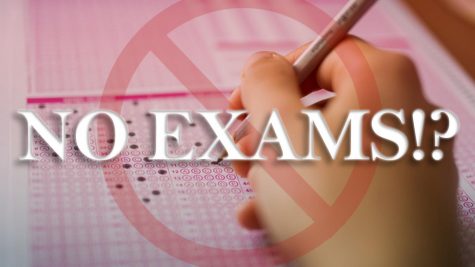New district policy means less testing for certain AP, IB, reading students
Photo Leana Pustam
New district rules mean students in classes that already take high stakes classes will not have to take semester two exams.
January 4, 2017
Finals will be reduced starting this spring for students taking high stakes classes, thanks to a new district initiative to reduce testing on students. Starting with the Spring 2017 exams, students enrolled in year-long AP classes, IB senior-level classes or full-year reading classes will not have to sit for a district final exam.
“The district is starting to phase out some of those second semester exams in a response to state legislature and public outcry that we’re over-testing students,” said Brian Hoover, Assistant Principal for Magnet Curriculum. “…The district reviewed all of the exams and figured that there are other ways that we can assess that students in IB classes, AP classes and yearlong reading classes are making gains.”
The district already has a similar policy in place for EOC courses, such as Biology, Algebra and US History, where the end of course exam counts for the student’s semester exam grade. The AP/IB/reading policy differs as students will no longer have a semester two exam grade calculated into their semester grade for that course.
Instead, a student’s semester two grade will be determined from their third and fourth quarter grades, using a new grading scale Hoover says will be released in the coming weeks in a letter sent home to students explaining the reasons for the change.
“This [semester exams] is one less thing that they have to worry about,” Hoover said.
The rule doesn’t change anything for non-senior IB students who may be taking an IB-level course that also sits for an AP exam, such as IB juniors enrolled in IB English III that also take the AP Language & Composition exam in the spring. It also doesn’t apply to semester-long AP courses such as AP Macroeconomics or AP US Government.
For seniors in IB or year-long AP courses, the policy means they will no longer have to take an exam if they miss more than five days of class. While the senior exam exemption policy remains in place, the courses no longer have an exam to exempt, meaning absences don’t play a factor in these exams. Seniors taking other courses will still have to sit for a semester two exam if they miss more than five days in a class.
“The exam exemption policy is the exact same. The attendance policy is the exact same,” Hoover said. “However, some students and teachers and community members are probably saying by there not being an exam there might be an unintended consequence.”
On the first class of the second semester, IB Biology teacher Craig Everhart reminded his seniors that semester exam or not, the rule change wasn’t an excuse to start missing class. Everhart, who teaches about 35 seniors a year, said historically, IB seniors haven’t had to take semester two exams because they don’t miss much class time.
Still, the new policy presented a little worry.
“We are concerned as instructors that that could be abused, that’s all,” Everhart said. “Most of our kids are pretty self motivated and try to perform well and they know that obviously being present is important.”
When asked about seniors who may view the new rule as a free pass to miss class, Hoover echoed Everhart’s sentiments.
“It’s up to me, it’s up to the teachers, it’s up to the students to remember that it’s still important to come to school everyday, that quality instruction is going on,” Hoover said. “You’re putting yourself behind by not going… exam exemptions shouldn’t be the only thing driving you to come to school.”




















